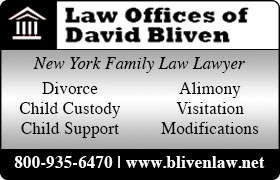Pleasantville Child Custody Lawyer, New York
Sponsored Law Firm
-
 x
x

Click For More Info:
-
The Law Offices of David Bliven
445 Hamilton Avenue, Suite 607, White Plains NY, 10601 » view mapFamily Law, Divorce, Child Support, Custody Representing All of Your Family Law Needs
With over 17 years of experience helping people through difficult family law issues, we have the knowledge and skill needed to ensure you and your children are protected.
914-861-4805  David Bliven White Plains, NY
David Bliven White Plains, NYAttorney At Law - New York, 1998
New York Law School, J.D. - 1997
 About Us
About Us16 years of experience helping people of Greater White Plains and the Bronx, New York with Family Law issues.
 Our ServicesAll Family Law
Our ServicesAll Family LawCivil unions, marriages, divorces, adoption, prenuptial agreements, child custody, and property settlements.
Includes: Guardianships & Conservatorships, Custody & Visitation
Lisa E Zeiderman
Family Law, Divorce, Child Custody, Divorce & Family Law
Status: In Good Standing Licensed: 19 Years
Katherine A. Lynch
Condominiums, Litigation, Estate Planning, Guardianships & Conservatorships
Status: In Good Standing Licensed: 25 Years
Lawrence Jay Braunstein
Divorce, Child Custody, Property & Casualty, Accident & Injury
Status: In Good Standing
Nancy D. Kellman
Divorce, Child Custody, Property & Casualty, Accident & Injury
Status: In Good Standing Licensed: 39 Years
James J. Nolletti
Family Law, Divorce, Child Support, Child Custody, Divorce & Family Law
Status: In Good Standing
John Lawrence Marchione
Bankruptcy, Household Mold, Public Interest Law, Child Custody
Status: In Good Standing
Frances M. Pantaleo
Wills, Trusts, Guardianships & Conservatorships, Elder Law
Status: In Good Standing
Anthony J. Enea
Nursing Home, Estate Planning, Guardianships & Conservatorships, Elder Law
Status: In Good Standing
John Anthony Pappalardo
Mediation, Arbitration, Child Support, Child Custody
Status: In Good Standing
Marianne L. Sussman
Commercial Real Estate, Litigation, Estate Planning, Guardianships & Conservatorships
Status: Retired Licensed: 45 Years


 David Bliven White Plains, NY
David Bliven White Plains, NY About Us
About Us Our ServicesAll Family Law
Our ServicesAll Family Law
